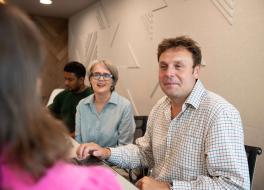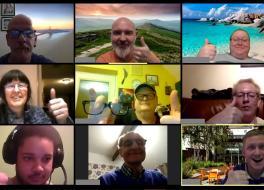
Working together for change

Ahead of his appearance at a stammering event this September, Jack Nicholas writes about the benefits of getting together as a community.
I am currently preparing to speak at the upcoming event 'Stammering Pride Against Prejudice' on Friday 15th September. As someone who stammers, it's not something I could ever imagine doing.
At the all-day event at the City Lit in London, I'll be taking part in a discussion panel about 'stammering language'. I am rehearsing furiously but feel strangely calm. After all, no one is going to mind what I sound like!
But how did I get here?
I know a little bit about stammering. I should do as I have been doing it a long time. I am ignorant of the technicalities of how muscles interact or the pros and cons of any particular therapy — these all whoosh past me. But I've watched and listened to myself stammering for many years and I think that gives me some sort of expertise. One thing I have learnt is that stammering is endlessly variable. Whenever you think you have got it worked out, it changes.
Stammering is often lonely and isolating, but it is an experience others share and it can bring people together.
A recent change for me is that I worry less about what people might think when I stammer. Unfortunately, that has given my brain space to worry about other things! For example, a big current worry is:
Why is it that in 2023, people who stammer still face so many difficulties and challenges?
Why are people in some parts of England finding it hard to access speech therapy? Why do some GPs insist you phone the surgery if you want an appointment? Why do journalists still talk about a 'stuttering performance'? Why do job adverts still ask for 'excellent communication skills' when they really mean 'fluency'? And why are people still sometimes laughed at when ordering a drink in a coffee shop?
From overly rigid systems to outdated perceptions and sheer thoughtlessness, all these challenges mount up.
STAMMA is doing a lot to turn this round. There is this website. The helpline and webchat service is being expanded to many more hours a week. There is an ever more active Employment Service and the recently launched Advocacy Service. There are campaigns like 'No diversity without disfluency' and 'It's how we talk'. All this, of course, reflects the STAMMA mission: Creating a better world for people who stammer.
Others in the stammering community are trying to make a difference and create a better world for people who stammer too. A loose (and loosely-defined) collection of people are looking at different ways of challenging current perceptions and structures. This is often called 'Stammering Pride' — I am still not sure this is the right name, although I accept that 'I believe that you should be able to stammer on your own terms without getting hassled for it' is a little longer and less catchy.
The power of conversations
This is what the event at City Lit on 15th September will be about. 'Stammering Pride Against Prejudice' is an opportunity for people who stammer and their allies to get together and throw ideas around. There'll be conversations between artists, musicians, speech therapists, thinkers and people like me who are none of these but who stammer and want to do something that might make a difference to someone somewhere.
Talking together, you get ideas you could not have had on your own. You learn what you do have in common with others, and how you can help each other.
I first heard about the concept of Stammering Pride when I joined STAMMA. The ideas being discussed seemed hopeful and invigorating. I learnt more in a series of Zoom discussions facilitated by Sam Simpson and Patrick Campbell, who have both done so much to encourage new ways of thinking about stammering. The group was a wonderful mixture of people and everyone was very tolerant of me, an ignorant newbie who thought he had all the answers!
Now it's my turn to talk. As part of a panel at the upcoming all-day event, I want to discuss the power of conversations — not to change other peoples' point of view but to work together and create new ideas. And I want to talk about 'stammering language' — why is it always negative? Why can't we talk about powerful, graceful, brave, successful stammering?!
Why not come along if you can? Stammering is often lonely and isolating, but it is an experience others share and it can bring people together. STAMMA is a community. So are events like this. Talking together, you get ideas you could not have had on your own. You learn what you do have in common with others, and how you can help each other. And, once together, you stand more chance of making a difference.
For all my worries about where we are today, I also think this is an exciting time for people who stammer. A lot is happening and many people want to do something positive, however small.
I don't know where all this will end up — but stammering is always variable, unpredictable, and will take us places we can never expect!
How do you feel about Stammering Pride? Read articles for and against from our supporters:































